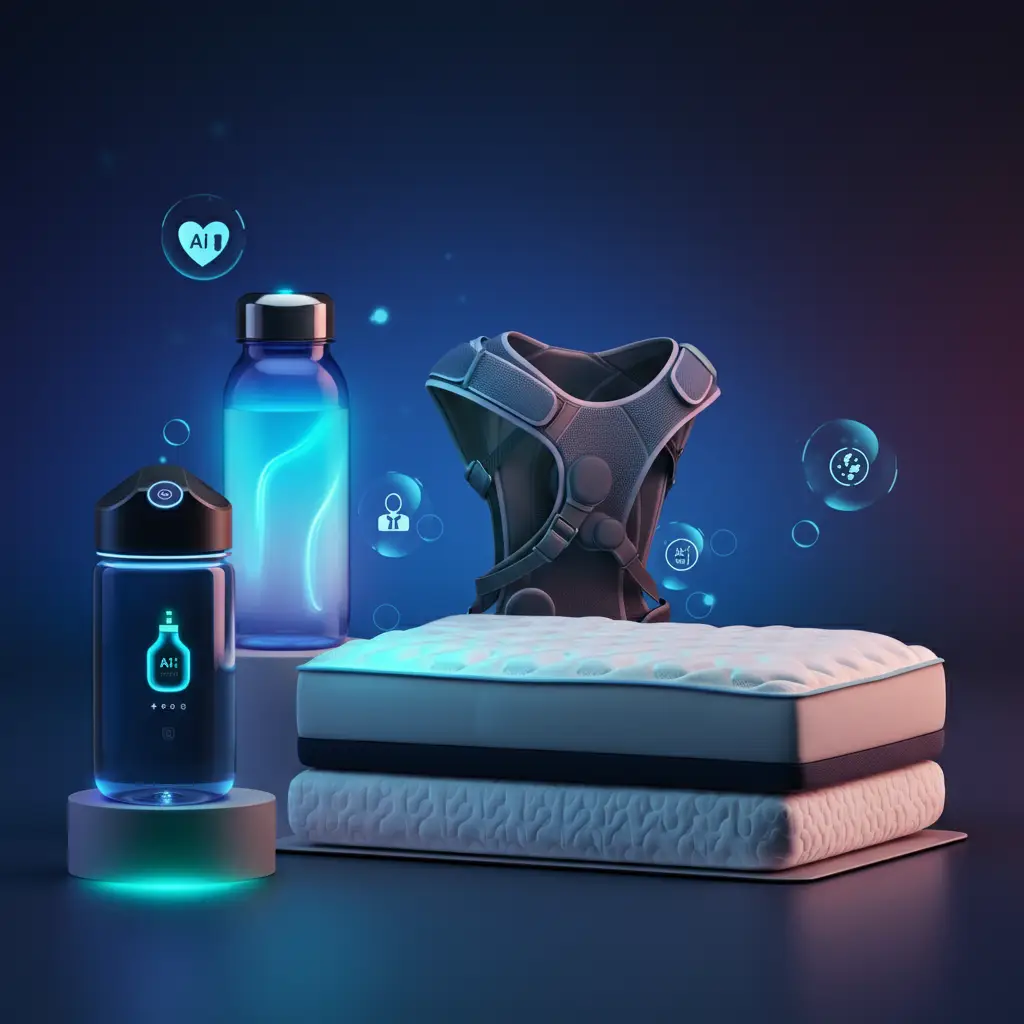
Advancements in artificial intelligence (AI) are influencing nearly every facet of our lives, and wellness is no exception. From smarter water bottles to posture-correcting devices, AI-powered tools are not just trendy; they’re reshaping how we approach personal health management. What’s driving this surge in AI wellness? And how exactly are these innovations enhancing our well-being? Let’s explore the growing momentum behind AI wellness and key technologies making waves.
The Rise of AI in Health and Wellness
AI wellness is booming for a variety of reasons, starting with the rising demand for personalized health solutions. Today’s consumers are more health-conscious than ever, especially midlife users and Gen Xers, who now dominate the wellness tech market. They want tools that simplify health management, integrate seamlessly with their daily routines, and deliver actionable insights in real time.
Additionally, AI wellness products appeal to a busy modern lifestyle. People across age groups are seeking smarter, less intrusive ways to stay healthy, and AI makes this possible. By gathering and analyzing data, these innovations empower users to understand their health on a deeper level without the guesswork.
Transformational Technologies in AI Wellness
AI-powered devices are carving out a niche in the wellness industry. Products once considered “nice-to-haves” are now essential tools for managing sleep, hydration, posture, and more. Here’s a closer look at some game-changing technology:
1. Smart Hydration with AI-Enabled Water Bottles
Dehydration can zap your energy, impair cognitive function, and even lead to long-term health problems. Enter the Gatorade Smart Gx Bottle, a hydration tool that lights up to remind you to drink water. The device syncs effortlessly with your smartphone, gathering hydration data and offering personalized insights.
This innovation isn’t just about drinking more water; it’s about drinking wisely. By teaching users when and how much water to drink, smart bottles make staying hydrated less of a chore. For midlifers looking to combat fatigue and mental fog, this technology is captivating the market.
2. Posture Perfection with AI Guidance
Poor posture is a challenge for many, especially for those who work long hours at a desk. AI-enabled posture correctors like Upright Go provide instant feedback to help users maintain a healthy spine alignment. Devices like these go beyond simple reminders; they deliver analytics, personalized exercises, and progress tracking.
Such tools are invaluable for individuals suffering from back pain or hoping to invest in long-term musculoskeletal health. Midlife users, in particular, are drawn to these non-invasive solutions that can extend their years of mobility and ease discomfort.
3. AI-Driven Sleep Optimization
Sleep technology is another arena where AI is making an enormous impact. Devices like the ChiliPad Cube, a cooling mattress topper, use AI to learn your sleep preferences and adjust your bed temperature in real time. The result? Deeper, more restorative sleep sessions.
Given that inadequate sleep is linked to numerous health issues—including heart disease, cognitive decline, and weight gain—AI sleep aids offer a crucial advantage. By tailoring sleep environments to an individual, this technology helps users tackle a universal problem.
4. Innovations in Recovery with Cooling Wraps
AI-powered cooling wraps are breaking ground in both wellness and sports tech. These advanced devices use sensors to monitor body heat and automatically adjust cooling levels, accelerating recovery after workouts or reducing discomfort caused by inflammation.
This smart recovery trend speaks directly to active midlife users and fitness enthusiasts, who prioritize efficient yet high-tech solutions for their well-being. Cooling wraps provide a compelling blend of convenience and medical-grade benefits.
The Broader Impact of AI Wellness
Beyond individual products, the rise of AI wellness signals a deeper shift within the industry. Wellness is no longer a one-size-fits-all endeavor. Thanks to AI, personalization is becoming the standard. Users now expect health solutions tailored to their specific needs, goals, and lifestyles.
AI also amplifies accessibility. Tools once limited to professional settings or elite athletes are now available to everyday consumers. This inclusivity makes wellness gadgets more appealing across broader demographics.
Additionally, the use of AI helps users become more proactive in their health. By delivering actionable insights, these tools encourage preventative rather than reactive care, which reduces long-term healthcare costs.
Driving Interest Among Gen Xers and Midlife Users
Why is AI wellness particularly resonating with midlife users and Gen X? This demographic is both tech-savvy and health-focused, looking for ways to extend their active years and improve quality of life. Having grown alongside the evolution of personal tech—from early fitness trackers to cutting-edge smart devices—they are eager adopters of systems that simplify health management.
Products like smart bottles and posture correction devices appeal directly to their priorities, whether it’s optimizing hydration, combating back pain, or getting better sleep. For this group, AI wellness isn’t just a convenience; it’s an investment in longevity.
What’s Next for AI Wellness?
The future of AI-powered wellness looks incredibly bright. Innovations on the horizon include AI-driven mental health tools, nutritional coaching apps, and even wearable devices capable of early disease detection. With AI, the possibilities are virtually limitless.
More importantly, the surge in AI wellness reflects a growing awareness of health’s interconnectedness. Rather than treating symptoms in isolation, we’re moving toward tools designed to improve our overall well-being through simple yet powerful tech.
Final Thoughts
AI wellness is booming for good reason. From staying hydrated to sleeping better and improving recovery, AI-powered devices make wellness goals more achievable and sustainable. Whether you’re seeking solutions for decades-old habits or wanting to get ahead with cutting-edge tech, AI is transforming how we care for ourselves.
The question isn’t whether AI will play a role in wellness—but which products will become a part of your daily routine. With the rapid pace of innovation, there’s no time like the present to explore smarter ways to live better. Stay curious. Stay well. And, most importantly, stay smart.